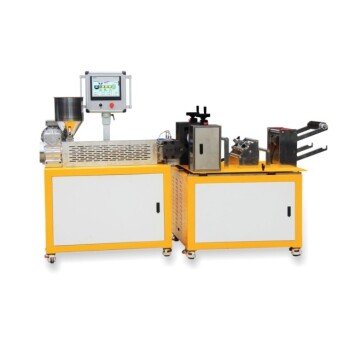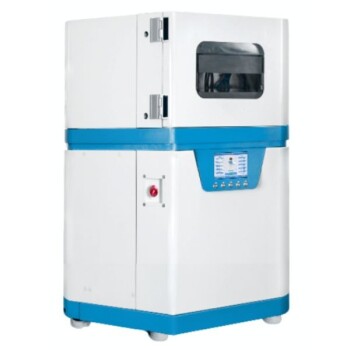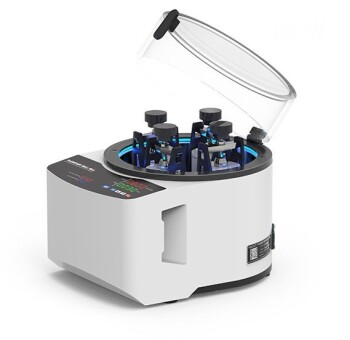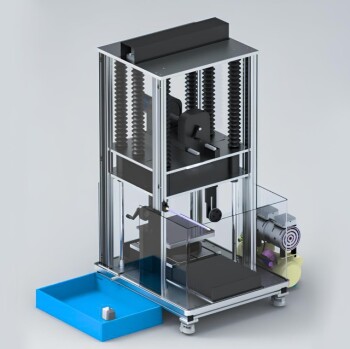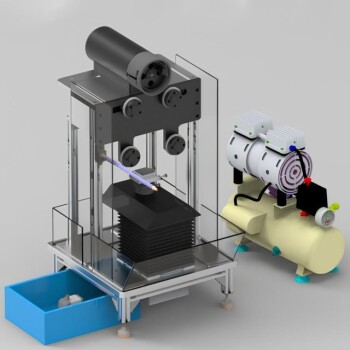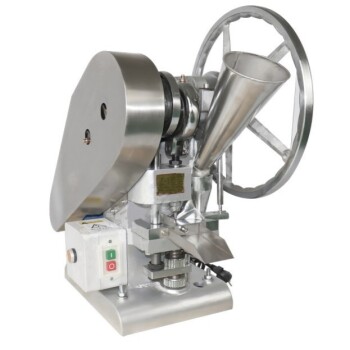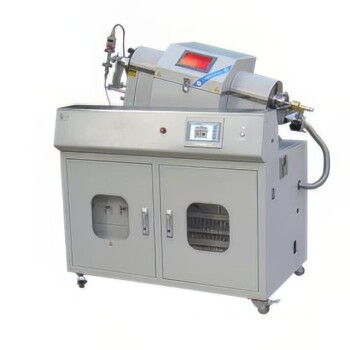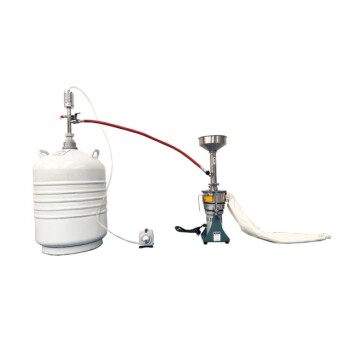A vacuum casting machine is primarily used to create small batches of high-fidelity plastic parts that faithfully replicate a master model. It excels at producing production-quality prototypes and end-use parts in low volumes by using a vacuum to draw liquid polyurethane resin into a flexible silicone mold, ensuring a flawless, bubble-free copy.
The core function of vacuum casting is not just to make parts, but to bridge the critical gap between a single 3D-printed prototype and expensive, large-scale injection molding. It provides a cost-effective way to get production-quality results in low quantities.
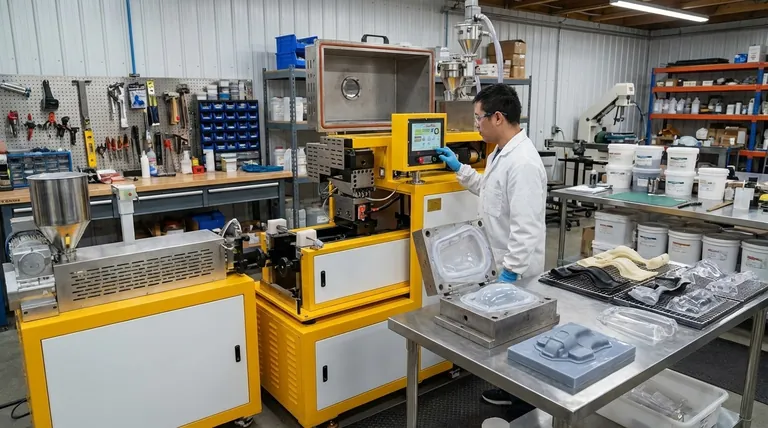
How the Vacuum Casting Process Works
The process is a multi-step technique where the vacuum chamber plays a critical role in achieving high-quality results. Each step builds upon the last to create a near-perfect replica.
Step 1: The Master Pattern
Before any casting can begin, a master pattern is created. This is the idealized, dimensionally accurate model of the final part.
Typically, this master is made using high-resolution 3D printing (SLA) or CNC machining to ensure exceptional detail and a smooth surface finish.
Step 2: The Silicone Mold
The master pattern is suspended inside a casting box, and liquid silicone is poured around it. The box is then placed in a vacuum chamber to remove any air bubbles from the silicone.
Once the silicone cures, it is carefully cut open, and the master pattern is removed. This leaves a hollow cavity inside the flexible silicone mold that is an exact negative impression of the original part.
Step 3: Casting with a Vacuum
This is the central function of the machine. The two-part polyurethane resin is mixed and placed inside the vacuum chamber along with the silicone mold.
The machine creates a vacuum, which removes all air from the chamber and, critically, from the mold's cavity. The resin is then poured into the mold, and the vacuum ensures it flows into every tiny detail without trapping any air bubbles.
Step 4: Curing and Demolding
After casting, the filled mold is often moved to a heating oven to accelerate the curing process. Once the resin has solidified, the flexible silicone mold is opened, and the brand-new, perfectly formed part is removed.
Where Vacuum Casting Excels
This process is not a replacement for 3D printing or injection molding; it is a strategic tool for specific applications where quality and quantity requirements align.
High-Fidelity Prototypes
Vacuum cast parts have a surface finish and visual quality that is nearly indistinguishable from injection-molded products. This makes them ideal for creating marketing samples, models for photoshoots, or prototypes for user testing and investor demonstrations.
Low-Volume Production
Tooling for injection molding can cost tens of thousands of dollars, which is not viable for producing only 50 or 100 units. Vacuum casting provides a cost-effective method for these small production runs or for bridge manufacturing while the steel molds are being made.
Material Simulation
A wide range of polyurethane resins are available that can simulate the properties of final production plastics. You can create parts that are rigid like ABS, clear like polycarbonate, or flexible and rubber-like, allowing for accurate functional testing.
Understanding the Trade-offs and Limitations
No process is perfect. Being objective about vacuum casting's limitations is key to using it effectively.
Mold Lifespan
The primary drawback is the limited life of the silicone mold. A single mold can typically only produce between 20 and 50 copies before it starts to degrade and lose fine details, requiring a new mold to be made from the master pattern.
Cost Per Part at Scale
The initial setup cost is very low compared to injection molding. However, the cost per part does not decrease significantly with higher quantities due to the materials and labor involved. This makes it uneconomical for mass production.
Material Constraints
While versatile, the process is limited to thermosetting polyurethane resins. You cannot use the exact production thermoplastics (like ABS, PP, or Nylon) that are used in injection molding. The properties are similar but not identical.
Making the Right Choice for Your Goal
Selecting the right manufacturing process depends entirely on your project's stage and objective.
- If your primary focus is a single, fast concept model: 3D printing (FDM or SLA) is your most efficient option for speed and low cost.
- If your primary focus is creating a small batch (10-100 units) for market testing, sales samples, or functional prototypes: Vacuum casting is the ideal choice for its superior quality and material variety.
- If your primary focus is mass production (1,000+ units): The high initial cost of injection molding tooling is easily justified by the extremely low cost-per-part and speed at scale.
Ultimately, understanding the purpose of a vacuum casting machine empowers you to select the most intelligent and cost-effective path from idea to market-ready product.
Summary Table:
| Key Attribute | Vacuum Casting Advantage |
|---|---|
| Primary Use | Small-batch production & high-fidelity prototypes |
| Typical Volume | 20 - 50 parts per mold |
| Surface Finish | Near injection-molding quality |
| Best For | Bridging the gap between 3D printing and injection molding |
| Material Options | Polyurethane resins simulating various plastics (rigid, flexible, clear) |
Ready to produce high-quality prototypes or a small batch of parts? KINTEK specializes in laboratory equipment and consumables, including solutions for advanced prototyping and material testing. Our expertise can help you select the right tools to ensure your vacuum casting process is efficient and delivers flawless results. Contact our experts today to discuss how we can support your lab's innovation and production goals.
Visual Guide

Related Products
- Lab Plastic PVC Calender Stretch Film Casting Machine for Film Testing
- Small Injection Molding Machine for Lab Use
- Touchscreen Automatic Vacuum Heat Press
- Vacuum Hot Press Furnace Machine for Lamination and Heating
- Double Plate Heating Press Mold for Lab
People Also Ask
- Why is a laboratory-grade forced air drying oven required for alloy chip moisture analysis? Ensure Data Precision
- What is the difference between RF plasma and DC plasma? Choose the Right Plasma Source for Your Lab
- How are pore characteristics controlled in porous MAX phase production? Master Precision with Sacrificial Templates
- What is electron coating? A Guide to High-Performance E-Coating and Finishing Processes
- What maintenance should I do on my furnace? A Proactive Guide to Safety and Reliability
- What materials can be sputter coated? A Guide to Metals for SEM & High-Resolution Imaging
- How does heat treatment affect metal properties? Engineer Strength, Hardness, and Toughness
- What is the effect of cooling rate on casting? Control Strength, Ductility, and Defects
